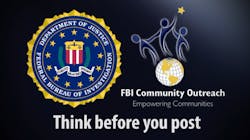FBI Warns Public About Social Media Threats
By Elvia Malagon
Source Chicago Tribune
CHICAGO -- It only took a few seconds for Jabari Dean to realize he had made a mistake.
In a moment of anger in late 2015, the then-21-year-old threatened a mass shooting at the University of Chicago in the comments section of a popular website. Dean quickly deleted the comment, but not before a New York teenager took a screenshot and notified police. The threat was taken so seriously that the U. of C. canceled classes and other campus activities.
Within days, the FBI traced the threat to Dean and arrested him on a federal charge of transmitting a threat in interstate commerce. The FBI found no weapons in the South Side home he shared with his mother and determined Dean never intended to carry out the threat.
In the FBI’s Chicago headquarters Thursday, Dean sat next to special agent in charge Michael Anderson as he spoke for the first time about what happened and warned others not to make the same mistake.
The FBI has seen an increase in similar online threats across the country and worked with Dean to release a 30-second public service announcement in hopes it will deter others.
“I search my name on the web almost every day and look at the stuff,” Dean said in the video. “It’s not going away. Think before you post.”
Dean wrote the online threat about a week after the court-ordered release of a video showing a Chicago police officer shooting black teen Laquan McDonald 16 times sparked citywide protests and escalated tensions between the Police Department and the African-American community.
“This is my only warning. At 10 a.m. on Monday mourning, I am going to the campus quad of the University of Chicago. I will be armed with an M-4 Carbine and 2 Desert Eagles all fully loaded. I will execute approximately 16 white males students and or staff, which is the same number of time McDonald was killed,” the threat stated, according to court records. “I then will die killing any number of white policemen in the process. This is not a joke. I am to do my part to rid the world of white devils. I expect you to do the same.”
Last summer, prosecutors agreed to drop the charge against Dean if he completed 100 hours of community service, including speaking out about his experience, and stayed out of trouble.
Dean did not want to detail why he posted the comment online. He said he was at home and angry, but he quickly realized he had made a mistake. Even though the agreement with prosecutors would mean Dean won’t have a conviction on his record, he said the fallout from the incident has cost him friends and his education and caused tensions within his family.
“I have a pretty bleak future,” said Dean, who apologized for his conduct. “I can’t pass background checks. I’ve been expelled from school. Yeah, it sucks.”
Anderson said the FBI has seen an uptick in online threats similar to the one Dean wrote. Some of the people do it as a joke while others are empowered by what Anderson described as “keyboard courage.” Whatever the motive, Anderson said, it could cost the public hundreds of thousands of dollars because multiple task forces are brought in to investigate every threat.
“We are seeing more threats and we are seeing more actions being taken,” Anderson said. “If you look at the school shooting in Rockford, Wash., just last week, so that is what’s in people’s minds when they read these posts. So we have enough real incidents that it is resulting in even more terror being associated with these threats.”
Bastiaan Vanacker, an associate professor and program director for the Center for Digital Ethics and Policy at Loyola University Chicago, said threats made to schools are now usually done through social media.
“It’s not uncommon to see this type of case pop up given how easy it is to make a threat because of the ubiquitous nature of social media,” he said. “Where as beforehand, people might think twice before making a phone call or mailing that letter. It’s much easier to do something rash and stupid.”
More social media education about how even anonymous posts can be traced can eventually result in less online threats, Vanacker said.
Anderson said that after it was determined Dean never had plans to carry through with his threat, the FBI saw the incident as an opportunity to bring awareness about the severity of online threats.
“We are able to use this as a platform to warn others so history doesn’t continue to repeat itself,” Anderson said. “Or if anything, we can cut down on the number of these threats because we have to share these cautionary tales, and we appreciate his cooperation in doing so. So I think it’s a good, proper compromise for him legally and then allows us to get his message out.”
For Dean, the ordeal has left him thinking twice about how he spends his time online.
“I’m done with social media,” he said.
———©2017 the Chicago Tribune
Visit the Chicago Tribune at www.chicagotribune.com
Distributed by Tribune Content Agency, LLC.



